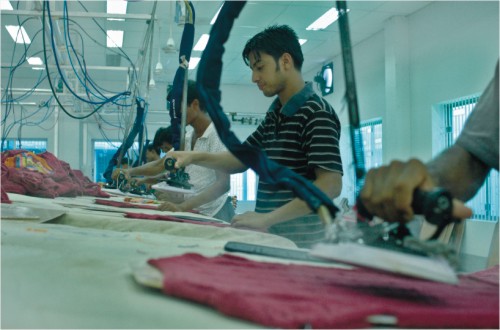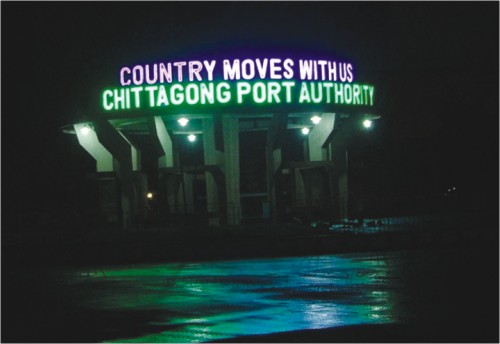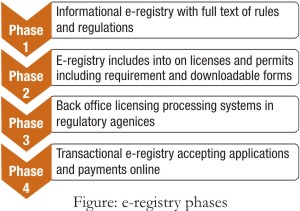
Inside
|
E-registry of Rules, Regulations and Licenses Mohammad Azad Rahman explains and actualised step towards a digital Bangladesh Do you know what rules and regulations apply to your business? Selina Raihan is a successful fashion designer. She has a small garments company producing her own brand. Recently she met some international buyers who liked her work and wanted to place an order. Both Raquib and Selina need to get licenses from authorities. Raquib knows that he needs a trade license but he also heard that there are other licenses required to run a feed mill. He needs complete information from a reliable source. Though Selina has a trade license, pays her taxes regularly and provides good working conditions as per the labor law for her workers, she does not know anything about exports. She needs information on the regulations and requirements. Talking to friends and government officials has only made them more confused: there is no single place they can go to access all the required information. After a few months of frustration, they are now considering abandoning the opportunities that had so excited them.
The problem: regulatory uncertainty Currently business-related rules, laws and regulations are published in government gazettes that are difficult to access for most businesses both at home and abroad. Businesses have to incur costs just to know what rules and regulations are currently enforced. A host of private and partial compilations of business regulations exist, but none comprehensively provide the certainty businesses and new investors need. Often, business intermediaries who provide support services do not know which regulatory requirements are enforced and which are not. As a result, many businesses in Bangladesh, often SMEs with a lack of resources to spend on expensive lawyers, shy away from formality and end up paying unofficial fees to regulatory supervisors to avoid penalties. Foreign investors get frustrated and lose interest in investing in Bangladesh. The absence of an easily accessible inventory of regulations also hinders positive reforms such as the elimination of redundant regulations, the streamlining of existing regulations and the formulation of new, necessary regulations. This leads to the present regulatory burden on businesses. Light at the end of the tunnel: e-registry Electronic registers for laws and regulations are becoming increasingly common in developed countries. Bangladesh is about to join the small number of developing countries that have established e-registries! A common feature and goal of e-registers is to centrally collect and publish information about regulatory requirements imposed on businesses and citizens. Electronic regulatory registers help reduce regulatory transaction costs and risks, improve transparency and accountability, and provide a platform for further regulatory reform. Spreading the word
In order to make the e-registry accessible to areas outside the capital, urban, semi-urban and rural areas, various channels can be used. Though not too many people own computers, internet penetration in the country -- usage, familiarity and accessibility to the internet -- has been significantly improved via mobile web, telecenters and Community Information Centers (CICs) in the private sector and SME helpdesks with computers and internet connections in the chambers of commerce and Bangladesh Small and Cottage Industries Corporation (BSCIC) estates. These centers have qualified operators who help users find information for a nominal fee. These service providers serve a wide range of citizens and businesses. Other innovative service providers, such as "infomediaries" (information intermediaries, mostly trained women, similar to Grameen Phone ladies) working in the rural areas, go house to house collecting the information needs of rural households, especially women, then return to the information centers to collect and compile the required information. To increase the outreach, center operators and the infomediaries will be informed about the e-registry, its functionality and benefits. They could be trained on how to search and find relevant regulation and license information. Regular media events to highlight the uses of the e-registry can be hosted by business associations and district chambers. Benefits to Bangladesh manifestation of digital bangladesh Improved interface between government and private sector Existing one-stop shops such as the Registrar of Joint Stock Companies and Firms (RJSCF) and Board of Investment (BoI) online registration can increase their range and efficiency of services by linking to the e-registry to provide better support to businesses. In Bangladesh, many virtual one-stop shops are coming up which will lead to confusion. The e-registry can link all those one-stop shops in an intelligent manner so that the user only gets so see what s/he needs. Improved transparency A registry adds further value through the quality of more user-friendly and precise access, such as search functions. Access to information
The e-registry has advanced search features so that users can search for particular pieces of regulations. Regulations are organised and searchable against their parent law, ministry, agency, sub-agency, date of publication, sector and purpose. Users can do a free text search as well. The registry will contain both Bangla and English texts to ensure accessibility for both Bangladeshis and foreigners. Regulations are organised in such a way that users will be able to view the latest version of the regulations and the amendment trail of that particular regulation. Reduced regulatory costs Reduced regulatory risks The legal value of data in a register can typically vary from being purely informational to providing full legal security. "Positive legal security," as implemented in Mexico and Korea, means that regulations that are not in the registry are not legally binding and cannot be enforced. In countries like Singapore, the e-registry is known as the OBLS (Online Business Licensing System). A business can log into the site and search for licensing requirement information. The OBLS requires all information within a single form that then is processed at various agencies so the user gets all the necessary licenses from that one form after a predefined time. However, not all the agencies in Singapore provide automated licensing, but the OBLS provides their web links and instructs users on how to obtain those licenses.
Improved accountability and reduced corruption Basis for regulatory review The obligation to register regulatory requirements will encourage reformers to analyse every requirement in a systematic way. Often the process of populating the registers leads to the identification of inconsistent, duplicative and incoherent regulatory requirements. The registration exercise can therefore help harmonise regulatory requirements including fees under the registry's common data definitions. An e-registry can also help improve the scope for inspection of reforms by exhaustively registering the list of enforceable requirements. Basis for continuous monitoring of regulatory performance Proper management of the registry will enable the government to develop management tools and procedures to maintain a high quality regulatory framework. The e-registry can help the regulatory authority set up indicators and scoreboards, providing a real-time comprehensive picture of the state of the regulatory framework and initiatives. These indicators can be used to organize and target the regulatory reform program, i.e. a 25% reduction of administrative burdens as in the case of Bangladesh. Thus, the e-registry can become the backbone of reengineering initiatives of administrative processes. How the e-registry in Bangladesh came about The scoping mission report was submitted to the Regulatory Reform Commission (RRC) and the concerned government agencies. In the eighth meeting of the RRC in July 2008, the commission recommended the establishment of a business related e-registry at the Board of Investment (BOI). Key milestones achieved so far Next steps The e-registry of rules, regulations and licenses will come out as a multistage project (see diagram below). In the first stage, information on rules and regulations will be launched. This should happen in the next couple of months. Phase 2 is expected to be ready by mid-2010. Phase 3 and 4 depends on the automation of agencies. As agencies are automated, their forms will become available during phase 3. RJSC has already been automated, so its forms will be readily available from the start. Mohammad Azad Rahman is an Investment Policy Analyst at the Bangladesh Investment Climate Fund.
|




